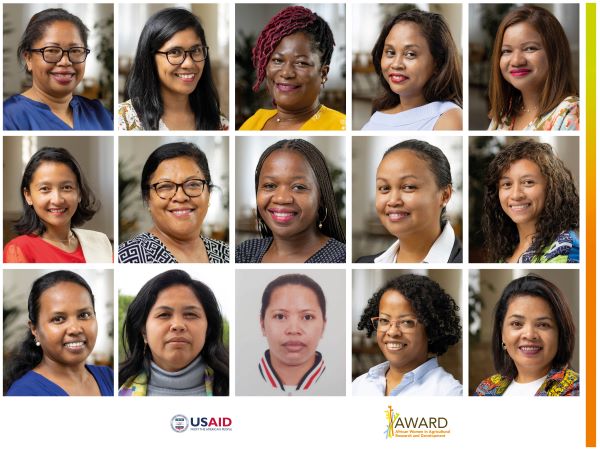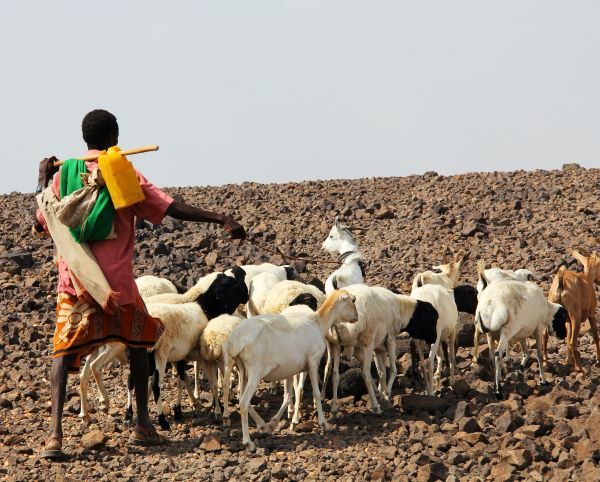In Madagascar, an estimated four in five people rely on agriculture for their livelihoods – yet the sector’s contribution to total exports (37%) and gross domestic product (29%) is markedly limited. Bottlenecks to agricultural growth include unchecked land use change and associated biodiversity loss; poor access to infrastructure and services, such as irrigation and roads; and the country’s vulnerability to an increasing variety of climate shocks.
In addition to these challenges, “Women are underestimated, especially in the agricultural industry. They are sensitive to the community’s wish for socioeconomic change and they deserve credit,” says Laurette Ratsimbazafy, AWARD Policy Fellow and Regional Director of the Agricultural Development Fund in northern Madagascar.
Women in Mozambique’s conservative communities face similar challenges of inequality within the agricultural sector: “Men usually feel like empowering women is disempowering them [men],” says Doreen Tekedese, Gender Equity, Social Inclusion, and Agri-Business Coordinator at International Development Enterprise in Mozambique. In Mozambique, the agriculture sector employs about 70% of the active workforce – of which 59% is female labour – but productivity remains low due to underdeveloped value chains and limited agro-processing to add value.
To address the challenges smallholders face and close gender gaps in agrifood systems, transformative policy change is needed – a key focus of the GRASP Policy Fellowship. For its second phase, the GRASP initiative has targeted six new countries: Burkina Faso, Ethiopia, Madagascar, Mozambique, Rwanda, and Senegal. The selected applicants have at least 10 years’ experience in agriculture and food system policy at national, regional, or continental levels, with most working in social sciences.
As part of their training, the GRASP Policy Fellows learn how to become effective negotiators, sharpen their skills to design gender-responsive policies, and build collaborative relationships with diverse policy stakeholders. They also receive catalytic funding and access to networks to enable them to lead agricultural policy processes that integrate gender.
Technical solutions
Although world-famous for its vanilla, Madagascar also has a comparative advantage in several other value chains with high export potential, including cocoa, lychees, and livestock products. To support the country in realizing its agricultural potential, various development organizations, including the Agricultural Development Fund, have provided producers with inputs and equipment. “We also help with technical training, managing operations, revolving loans, and management of associations,” adds Laurette. She explains that the Fund always gives priority to female household heads and young farmers. Through the GRASP Fellowship, Laurette hopes to acquire new skills in lobbying and learn about women’s leadership, particularly with regard to agricultural policy.
Also working to deliver agricultural technology to Madagascar’s rural women is Deutsche Gesellschaft für Internationale Zusammenarbeit (GIZ), where Holy Razafindrandretsa works as a Technical Advisor for Public Relations. “I had the idea to develop agricultural technologies that will provide farmers with practical information about their activities,” she says. Holy’s dream is now becoming a reality: GIZ has designed a system that offers farmers up to five free calls a month to obtain a wide range of advice in real time, such as weather forecasts. “We have worked with our partners to provide content based on prerecorded messages,” explains Holy, who participated in adapting messages to local cultures.
In Mozambique, Nilda Rosa Francisco’s technical support work with the Institute of Agricultural Research involves collecting data on the challenges of livestock production and management. “I help assess the sustainability of technologies and veterinary services that provide solutions for livestock farmers and improve rural incomes,” she explains. Such services include boosting vaccination availability to reduce disease, and connecting farmers to animal health specialists for advice on livestock management practices, including optimal feed formulation. As an AWARD Policy Fellow, Nilda is keen to learn how to formulate and implement gender-inclusive policies that address livestock production and management.
The mentorship mission
In addition to enabling the Fellows to build on their research and policy development skills, the GRASP Fellowship fosters a mentoring culture to catalyze intergenerational learning. Through the Fellowship, Holy also has ambitions to create a network of African women leaders in the agricultural industry – who, together, can develop increasingly resilient agricultural systems. To aid her in realizing this goal, she hopes to gain the relevant expertise from her mentor, Carole Rakotondrainibe, former Manager Director of Nexta, a platform dedicated to fostering and empowering Malagasy entrepreneurship.
Yolande Razafindrakoto Leondaris, Head of Technical Assistance Mission at the Institute for Research and Application of Methods in Madagascar, is counting on her GRASP mentorship to help her devise effective agroecological transition policies for women in rural areas a reality. She is excited to learn from her mentor Christian Camara, an Environmentalist and Permanent Representative of the Missouri Botanical Garden, as well as from other Fellows. “My goal is to join networks of rural women with similar beliefs who are well aware of the reality on the ground,” Yolande says. “This is really important to me. I want to share more experiences.”









